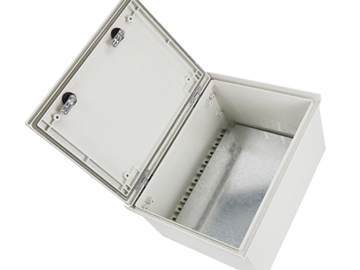We usually use non-metal distribution boxes. In addition to high safety performance, what are the characteristics of non-metal distribution boxes? The non-metal distribution box manufacturer tells you the characteristics and advantages of the box material:

1. Good electrical performance
Fiber-reinforced polyester materials used in the manufacture of electrical products have the following electrical properties:
Insulation resistance (24h immersion in water): 1.0x10 MΩ
Arc resistance: 180s
Tracking resistance index: ≥600v
Insulation protection and anti-creepage index comply with DIN/VDE related standards. This material not only has excellent electrical insulation, but also maintains good dielectric properties at high frequencies, is not subject to electromagnetic effects, and does not reflect electromagnetic waves. These properties are far beyond what metal materials can compare.
2, chemical resistance
The fiber-reinforced polyester material of the transparent meter box has good corrosion resistance characteristics such as acid, dilute alkali, salt, organic solvent, seawater, etc., while the metal material is not resistant to acid and seawater.
3, light weight and high strength
Specific strength and specific modulus are one of the indicators to measure the bearing capacity of materials. The specific modulus of fiber-reinforced polyester material is equivalent to that of steel, but its specific strength can reach 4 times that of steel.
4. Notch sensitivity
When the component is overloaded and a small amount of fiber breaks, the production load is quickly distributed on the undamaged fiber to reach the mechanical balance again. This is incomparable to metal components.
5, good fatigue resistance
The tensile strength of fiber-reinforced polyester material is slightly better than that of steel. The fatigue resistance limit of steel and most metal materials is 40%-50% of its tensile strength. The fatigue resistance of fiber-reinforced composite materials is produced by professional power distribution equipment. The limit is generally higher than this value, and the highest can reach 70%-80%.
6, low thermal conductivity, small expansion coefficient
The thermal stress generated when there is a temperature difference is much smaller than that of metal.
7, excellent UV resistance and anti-aging performance
Among non-metallic materials, fiber-reinforced polyester materials have excellent anti-aging properties. The anti-aging performance test shows that the maximum aging thickness of the surface is less than 50μm in 20 years in different places of use and different climatic zones. The minimum thickness of most boxes is 5mm, which is less than 1% of the thickness of the box, so there is no obvious impact on the mechanical properties of the box. Lingwai adopts a special UV-resistant surface treatment process to further strengthen its aging resistance.
8, low thermal conductivity, small expansion coefficient
The thermal stress generated when there is a temperature difference is much smaller than that of metal.